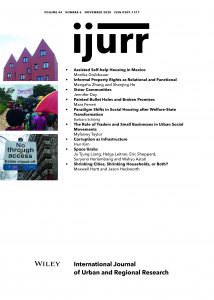In the face of state‐led land grabs, enterprising Chinese peasants have started a revolution in the ambiguous and insecure rural tenure system by developing an extralegal property system known as the small property right (SPR). Using the SPR, peasants are able to capitalize on their property through the sale of houses built on collectively owned land. Little is known, however, about the specific process behind the development of the SPR by the peasants, or how this extralegal property system functions in terms of securing the use and transfer of property without the backing of law. This article aims to clarify the situation through the lenses of the Endogenous Nature of Institutions and Relational Contract Theory, aiming to understand the socially constructed, endogenous and relational nature of the property rights that make SPR functional. Based on an ethnographic investigation of Beijing’s largest SPR housing settlement, we show how enterprising peasants develop long‐term relational contracts with urban households for the provision of housing services, secured on the basis of the common interests and symbiosis of the two parties and a reputation system that serves to deter defaults. The discretionary treatment of SPR housing by local states serves as a further motivation for the village and the informal homeowners to preserve a stable property arrangement, with such a specific institutional setting being an exemplar of China’s pragmatic state entrepreneurialism.
Details
Written by:
Mengzhu Zhang & Shenjing He
Digital Object Identifier (DOI)
10.1111/1468-2427.12927
About DOI

